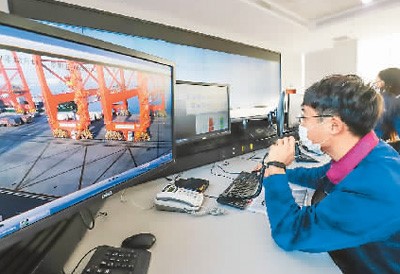




- BRNN
- BRI News
- BRNN News
- Database
Official Documents Polices and Regulations
Inter-government Documents International Cooperation BRI Countries
Business Guide Economic Data BRI Data
Trade
Investment Projects Latest projects
Cases - Content Pool
Digitalization has become an important means for traditional enterprises in China to upgrade their business activities in recent years, thanks to the accelerated digital transformation of the Chinese economy and society.
China State Shipbuilding Co., Ltd. has designed and constructed intelligent ships with fully digitalized functions, including remote control and autonomous navigation capabilities. China's State Grid, the country’s main power supplier, has established a new energy cloud platform to promote greater collaboration between more than 3,000 upstream and downstream enterprises.

An employee remotely controls equipment at a smart wharf at the Tangshan port in north China's Hebei province. (People’s Daily Online/Liu Mancang)
The Hong Kong-based Shing Kee Godown Logistics Co., Ltd., which is principally engaged in logistics businesses in over 60 countries and regions, has put a high priority on technological transformation, deploying new technologies such as big data, cloud computing, and the internet of things to improve its management and operational efficiency.
Data and information are vital to modern trade, said Guo Taicheng, chairman of the logistics company, adding that the development of the logistics and transportation industry is closely linked with advancements in information technology.
According to Guo, the company is currently promoting the construction of the World Commodity Trade Center, a major warehousing facility, and integrating the development of its online and offline businesses.
Digital technologies can help to effectively advance the development of other industries, according to Liu Dacheng, deputy director of the Internet Industry Research Institute of Tsinghua University.
The digital transformation of traditional industries plays an increasingly important role in their capacity to achieve the optimal allocation of resources, matching differentiated supply and demand, and helping enterprises lower their costs and improve efficiencies, Liu noted.
Liu added that digital transformation promotes the development of other businesses, enabling all-scenario applications, and creating more job opportunities.
In order to strengthen the in-depth integration of digital technologies with the real economy, local governments have continued to roll out their own plans.
Southwest China’s Chongqing municipality aims to promote the intelligent transformation of industrial enterprises to build more digitalized workshops and smart factories and establish 10 industrial internet platforms of considerable influence to enable more small and medium-sized enterprises (SMEs) to embrace cloud services.
Fujian province in southeast China plans to build more than 100 high-level digital innovation platforms and foster more than 3,000 pioneering companies and innovative digital companies by 2022. Meanwhile, south China's Guangdong province aims to develop the Guangdong-Hong Kong-Macao Greater Bay Area into a central hub for the world’s digital economy.
"Currently, China’s digital economy has been deeply integrated with the real economy," said Pan Helin, executive dean of the Digital Economic Research Institute at the Zhongnan University of Economics and Law.
While facilitating the transformation and upgrading of traditional industries, the digital economy is creating new growth points for various industries and transforming the way we produce things and live our lives, Pan added.
In an attempt to help enterprises accelerate their digital transformation, China has implemented a series of targeted measures. According to a recent notice jointly issued by China’s National Development and Reform Commission along with other departments, the country will vigorously develop intelligent manufacturing so as to promote a fundamental change in the development model applied to manufacturing and business operations, accelerating the development of industrial software and the industrial internet, and fostering collaboration between manufacturing, design and data platforms.

Tel:86-10-65368972, 86-10-65369967